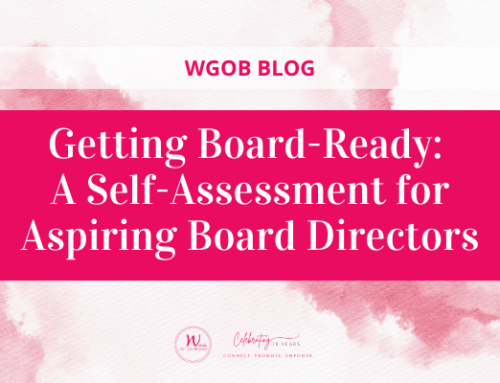A group of more than 100 engaged corporate directors, executives and governance professionals gathered at a Women Get On Board (WGOB) Toronto event to consider emerging expectations for boards in respect of Environmental, Social and Governance (ESG) issues. This WGOB event on February 24, 2020 was hosted by Gowling WLG, a WGOB National Strategic Partner. The Gowling WLG panel included environmental law associate Liane Langstaff; environmental law partner Jennifer King; and business law partner Stephen Pike. The panel was moderated by Kathleen Ritchie, Co-Head of Gowling WLG’s Toronto Business Law Department. You can read more about Stephen Pike’s presentation on governance to address modern slavery concerns here.
Broadening range of stakeholders
Recent amendments to the Canada Business Corporations Act (CBCA) codify as a matter of law that Canadian boards can consider a wider list of stakeholders beyond shareholders in making strategic business decisions. The list of interests specifically includes both the environment and the long-term interests of the corporation itself. The courts will give broad deference to board decisions within the reasonable range of business alternatives that also take into account environmental and other stakeholder positions as listed.
This development actually puts Canada ahead of the US in terms of the freedom of boards to address other stakeholder interests in addition to shareholders’ interests. In the US, the Business Roundtable issued a statement signed by 151 CEO’s stating that it was time to move beyond strict shareholder primacy.
Key members of the investment community such as BlackRock’s Larry Fink have taken public stands that they will start holding boards accountable for providing enhanced environmental and sustainability reporting in making voting decisions.
“American investors and CEOs are pushing to advance corporate governance in the US to a point where Canada has been for 12 years,” said Stephen Pike, noting that the amendment to the CBCA largely codifies a Supreme Court decision from 2006.
Climate change and proactive risk management
Boards should have climate change on their agenda. Climate change is an urgent global issue and is different from other ESG risks as it presents as a risk multiplier on existing environmental issues that a company may already be managing, such as water inputs. In acting in the best interests of the company, boards have a duty to be proactive and critically evaluate and address the material risks and opportunities associated with climate change.
The panel provided examples of climate change risk, framed more familiarly as transition, litigation, and physical risks.
“We’re going to have major transitions in the energy sector, in transportation, in infrastructure, in cities – anything and everything that affects Canadian business,” said Liane Langstaff.
Regulatory change
Key transition risks include responding to regulatory policies requiring businesses to shift to lower emissions, while accounting for uncertain or changing regulations like carbon pricing. Changing law, market risks, and reputational risk are also impacting major project approvals. The panel pointed to Teck
Resources’ announcement, the day before the Toronto event, that it was withdrawing its Frontier oil sands project application. Teck claimed that its withdrawal was in part because they had become a flashpoint for a broader discussion of climate change.
“”The tone [of the Teck withdrawal] shows how mainstream ESG has become. In its withdrawal letter, Teck pointed to rapidly changing global capital markets and stated that investors and customers are increasingly looking for jurisdictions to have a framework in place that reconciles resource development and climate change in order to produce the cleanest possible products,” noted Jennifer King. “Teck claimed that Canada does not have such a framework.”
“Opportunity is risk flipped on its head. As a good board you should be thinking about what opportunities the risks of climate change open up. Use your power as women and the fact that you can think out of the box and stop groupthink among boards to consider how you can access new markets and find opportunities to really reduce your resource use and reap cost benefits,” suggested Langstaff.
Resources for boards
Resources for boards include the Canadian Climate Governance Experts program of the Canada Climate Law Initiative, which helps directors and their boards think about strategic direction with respect to climate risks. Also, the Task Force on Climate Related Financial Disclosures has created a framework that companies can consider. It has been taken up by Canada’s five largest banks and six of the eight largest pension funds.
“There is a growing investor focus on these issues,” said Jennifer King. “Just because information available on long-term climate related financial risk is not precise, that’s not a bar to directors and officers acting now with a view to the best interest of the corporation. The duty of care requires directors and officers to address specific risks as well as new opportunities posed by climate change. Boards should ensure that their companies quantify and verify greenhouse gas emissions, monitor changes in performance and keep diligent records. Those steps would allow you to take advantage of new regulatory opportunities as well as meeting obligations that might be imposed in the future.”
Five climate change governance questions for boards
The panel suggested that boards should ask the following five key questions:
1. Does the company have a climate plan?
2. Does the board have effective governance of the climate strategy, including identification of climate-related risks?
3. Has the board embedded climate opportunities in its strategic planning, performance objectives, budgets, policies and enterprise risk management process?
4. Who in the company is responsible for climate-related risk and accountable for implementing the company’s strategy?
5. Is the board approving disclosure of the company’s efforts to manage climate change to investors and stakeholders, including integrating the disclosure in financial reporting?
The message is clear. Boards can and should consider broader ESG issues, including climate change going forward.
Jennifer King and Liane Langstaff are Canadian Climate Governance Experts with the Canada Climate Law Initiative, an initiative directed by Dr. Janis Sarra (University of British Columbia Law) and Professor Cynthia Williams (Osgoode Hall Law). The Canadian Climate Governance Experts program offers free sessions on effective corporate governance to address climate-related financial risks and opportunities to corporate boards of directors and Canadian pension fund boards. The Experts include lawyers, accountants, economists, capital markets experts, company executives, and governance experts. They are committed to giving boards the most helpful facts regarding how the current state of climate science relates to their sector, and the duties of directors, officers and pension fiduciaries in Canada.
To learn more about the Climate Change Law Initiative generally, or to book a session with another Climate Governance Expert, please contact program manager Joanne Forbes forbes@allard.ubc.ca.






